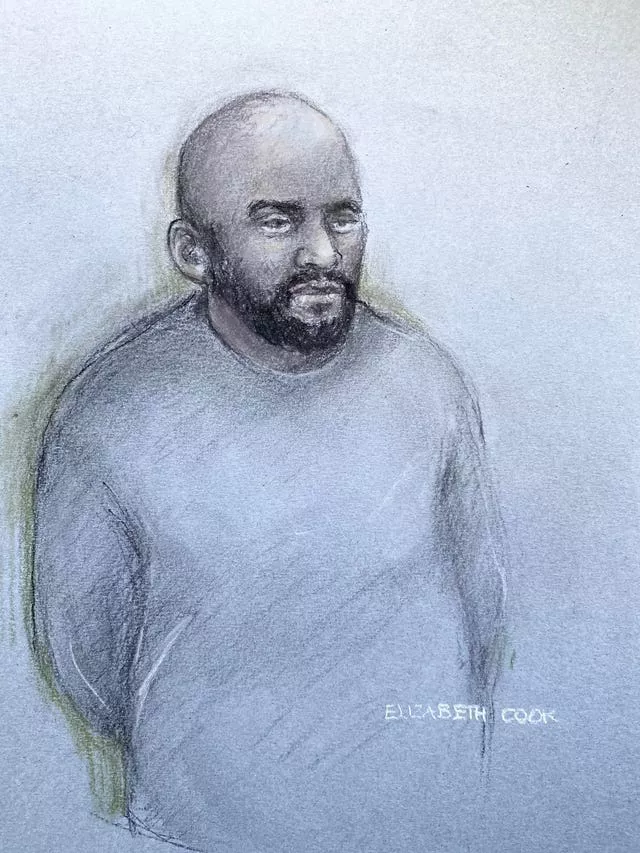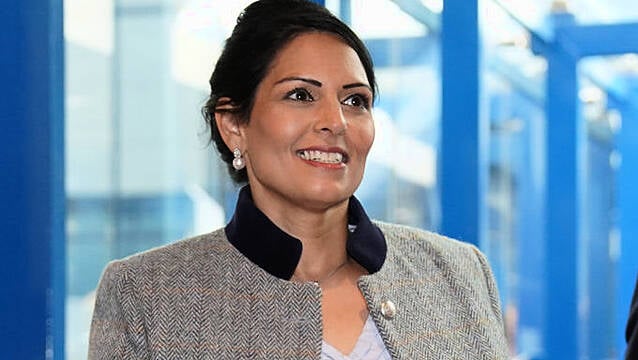Priti Patel allegedly “begged” the US to take on the case of British Jihadi Aine Davis, it can now be reported.
Details of the then-home secretary’s personal intervention emerged in legal argument at the Old Bailey in March.
It can only now be reported after Davis, once suspected of being linked to the so-called Islamic State (IS) death squad dubbed The Beatles, pleaded guilty on Monday to having a firearm for terrorist purposes and two charges of funding terrorism.
Defence barrister Mark Summers KC had claimed British authorities “connived” in the deportation of Londoner Davis from Turkey with a view to him being extradited onwards to America and face fresh charges there.
In 2022, Ms Patel made a phone call to a US attorney general, allegedly veering into “Alice In Wonderland” territory.
Ultimately, the plan was abandoned and Davis was arrested and charged with terror offences on his arrival in the UK from Turkey last summer.
Outlining the saga, Mr Summers said: “From 2018 onwards there was a complex and difficult set of proceedings surrounding the desire of the American government to prosecute two members of the Isis cell dubbed by the UK press The Beatles.”
Davis had been suspected since 2014 of involvement and in 2019 British MI5 officers visited him in a Turkish prison to ask him about it, the court was told.
Afterwards, the British consulate received complaints from Davis and his family that he was being mistreated, threatened and subjected to sleep deprivation, the court heard.
Meanwhile, two IS Beatles members – El Shafee Elsheikh and Alexanda Kotey – were convicted in Virginia in the US and handed eight life sentences each.
The third Beatles member Mohammed Emwazi – known as Jihadi John – had died in a US drone strike in 2015.
On June 18th last year, British officials learned that prosecutors in New York were seeking to extradite Davis to the US and charge him with providing “material support” to IS.
The following month, prosecutors in Virginia clarified they were not looking to put him on trial as a member of The Beatles cell, saying there were only three members.
By then, Mr Summers suggested the UK was “begging the US to take over the prosecution of Mr Davis”.
The case moved into “Alice In Wonderland territory”, with the Ms Patel phoning the Americans to get them to take the case, he said.
Mr Summers said: “The personal involvement of the home secretary trying to persuade a foreign country to prosecute a UK national is frankly extraordinary.
“It may have come to nothing but was seriously abusive. Trying to persuade a third state to prosecute one of our nationals is seriously irregular, and to facilitate his extradition there via the UK is also seriously irregular.
“The proper route would have been extradition from Turkey to America. That was assessed to be unrealistic – they’ve fallen out at an international level.
“It’s difficult to overstate the illegality and irregularity of what was under contemplation for some time.”
He went on to allege British authorities had influenced Turkey to issue Davis’s deportation for “ulterior motives”.
In early July, “consular official A” visited Davis in Ankara prison to inform him he was to be moved to a deportation centre and then be sent home within seven to 10 days.
Mr Summers said: “The evidence we submit is overwhelming – the Government knew full well what the Turkish deportation decision was going to be before the result, that can only be because they were involved in the decision making-process.”
When Davis asked for a passport he was told “it’s not going to happen”.
It was claimed he was told by the official that on arrival in Britain he would be questioned by the police, and then he could “get on with his life”.
When Davis said that would be “impossible” given the media attention, he was told he could not stay in Turkey.
Mr Summers suggested the timing of the visit was significant, coming the day after the deportation was leaked to British media.
On July 9th Davis was moved to a deportation centre where he was visited several more times by the consular official A in attempts to persuade him to leave voluntarily.
Mr Summers claimed: “The UK had connived in procuring the deportation order from Turkey with subjective ulterior motives.”
Between July 11th and August 4th attempts were made to prevent Davis from challenging his deportation and there was “reckless indifference” when he did seek to resist, it was alleged.
Mr Summers claimed Davis was even forced to share a cell with seven other people in a possible “deliberate attempt to break his will”.
On July 13, Davis refused to apply for a one-way travel document to the UK and said he wished to go to a third country instead.
In response, a consular official initiated steps for an emergency passport to be issued which did not require his consent.
Email evidence suggested that by July 20, British authorities knew Davis was asking to see a lawyer and that was “likely to prolong the legal process”.
After Davis was visited by a Turkish lawyer, consular official A allegedly told him the time to launch a challenge had expired.

He was offered the “no-brainer” option to go quietly on a private plane without the “media storm” of travelling on a commercial flight.
Mr Summers said: “This is a blatant attempt to get him to agree summarily for Davis to waive his legal rights.”
On July 30, Davis’s Turkish lawyer advised him to protect his interests immediately and the defendant scribbled out an application for asylum based on “fears for safety and double jeopardy”.
When he asked to speak to consular official A, he was allegedly told there was “no need” and that he would be informed.
In August, Davis was deported back to Britain, met at Luton Airport by counter-terrorism police and later charged with three terrorism offences.
The defendant, who entered his guilty pleas at the Old Bailey by video link from Belmarsh high security prison on Monday, will be sentenced on November 13.







